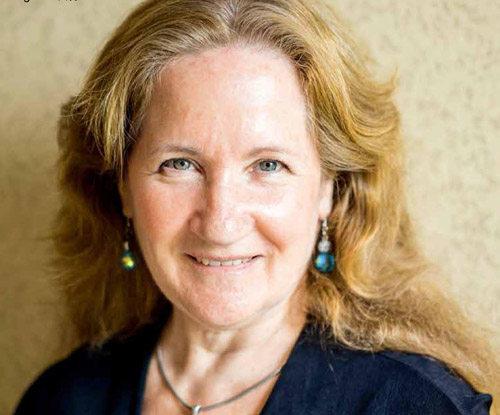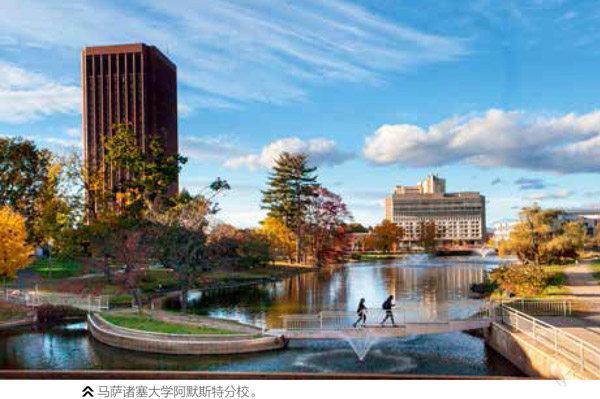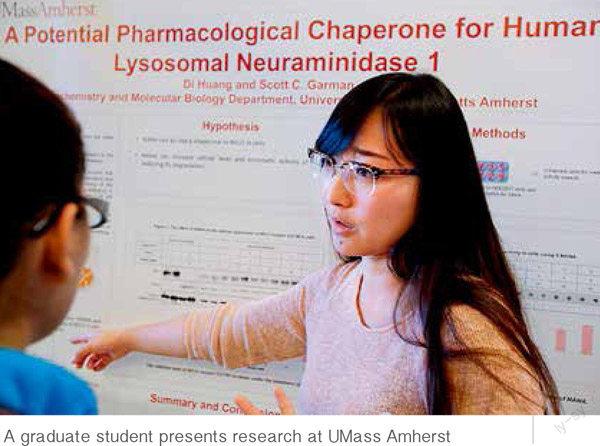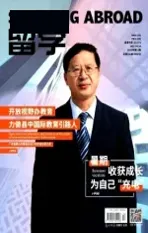专访美国麻省大学副校长Katherine S. Newman:推进公立高等教育 我能做的还有更多
2016-05-30彭杏月
彭杏月



于美国各大常青藤大学任教多年,Katherine最终选择回归老牌公立型大学。她的目标很明确——推广美国公立高等教育,为更多平民学生谋福祉。
打开Katherine S. Newman的CV,赫然入眼的是首页“哈佛、哥伦比亚、普林斯顿大学教授”这一类亮闪闪的名衔。然而,虽然任教于美国顶尖的私立学术研究机构多年,这些光环却并不是Katherine的终极目标,推广美国公立高等教育才是她一直以来的梦想。
作为一名昔日的受益者,Katherine将自己的一切成就都归功于曾接受的公立高等教育,如今,她希望以回馈者的身份回归公立大学,通过推动公立教育的发展,为年轻一代的平民阶层创造更多机会。加入马萨诸塞大学阿默斯特分校(以下简称 UMass Amherst)担任教务长和分管学术事物的高级副校长,正是Katherine实现这一梦想的开端。
切身体会成为动力
为帮助平民学生投身公立教育
Katherine生于加利福尼亚州的一个平民家庭,由于父母无力支付高昂的学费,她从小学起接受的便是美国的公立教育。所幸加州的公立高等教育发展十分完善,Katherine成功考取了加州大学圣地亚哥分校,之后她又在加州大学伯克利分校完成了博士学位的学习,毕业后,Katherine接连任教于美国多所常春藤院校。
投身高等教育几十年,Katherine在社会学领域颇多建树,如今更已成为美国学术界声名远扬的教授,但在规划下一步的人生发展时,Katherine发觉自己缺失了一些东西。在私立大学和顶尖学术机构的从业经历固然宝贵,可是,推广公立高等教育的愿望始终萦绕在Katherine心头。“我渴望回归公立高等教育,因为我本身就是公立教育的受益者,我很想以此为契机,为下一代的发展做出贡献。”
作为一名优秀的社会学者,美国社会的流动性和机会结构是Katherine十分感兴趣的研究领域。她发现:高等教育是一个人在社会链中取得上升性流动的巨大推动力之一。所谓上升流动,是指人们通过努力得以改变自己本来的状况,例如提升社会地位、仕途晋升、获得更高收入等,而高等教育在这个过程中扮演着至关重要的角色。而对于处于美国劳动力市场底层人们的就业情况的关注,也使Katherine愈发认识到教育的重要性。“不管在美国还是中国,好的发展机会往往会流向那些受过良好教育、拥有一技之长的人。”她向《留学》杂志记者举例:在60年代,人们单靠在流水线上进行体力工作,就足以养家糊口,但如今想要谋得一席发展,人们必须要受过良好的教育。因此,高等教育体系的构建,以及接受高等教育渠道的拓展,对人们日后的发展方向起着决定性作用。
在哈佛大学、哥伦比亚大学一类的顶尖大学从事教学和研究期间,Katherine发现,这些私立学校的学生大多家世显赫,而公立学校的大部分学生则来自平民阶层,这让她意识到:如果说有谁最渴望通过教育来改变自己的命运,那一定是这些就读于公立学校的学生们,家世平平的背景让他们迫切需要改变出身、提升自我。“我在学校上学时也有这样的感受,所以我知道高等教育对于拓展人生的可能性来说有多么重要。”
也正是因为拥有这种切身体会,Katherine立志推进公立高等教育的发展。而在这个当口,UMass Amherst这所老牌公立名校给了Katherine一个绝佳的契机,将她推广公立高等教育的愿望和提升底层劳动人民就业机遇这一学术兴趣实现了充分结 合。
推进中美教育交流项目
提供线上优质课程
加入马萨诸塞大学,Katherine看中的不仅是其作为一所一流公立性研究大学所拥有的卓越度,还有学校领导对于公立教育的坚持。“我欣赏UMass Amherst的领导团队,因为他们专注于公立教育的发展,致力于为年轻人的梦想铺路搭桥。”
如今,作为UMass Amherst的领导者之一,Katherine计划并创立了一系列项目,为来自低收入家庭的学生提供经济补助,创造更多学术研究的机会。Katherine了解,对于学术质量相当的私立学校和公立学校,私立大学往往向学生收取的学费比公立大学要高很多。相比之下,公立大学长期以来由各州政府资助,所以可以供更多人享受高等教育资源。“一个学生在UMass每年的开销,一共是大约2万3千美元,而在我以前工作过的约翰·霍普金斯大学,这一数字大约是每年6万2千美元。”
除此之外,Katherine还计划加深UMass Amherst与中国的合作。首先,UMass Amherst将对接中国的一流大学,共同设立合作项目,派遣美国学生到对方学校学习,这些项目可以涉及中国历史、建筑环境、农业和科学等任一领域。同时,增加中国学生来Umass Amherst的交流机会。Katherine向记者介绍,目前每年有数百名中国本科学生来到Umass Amherst学习,研究生数量也相当可观,其中大部分学生选择的是STEM学科方向的课程。Katherine想独辟蹊径,创办更多的短期研究生项目,同时发展以工程,计算机科学,经济,教育,英语等学科为主的线上授课,以此缩减学生的留学费用。
此外,Katherine还立志在线上教育方面率先开创中文普通话课程,以减小面对面英文线上授课的语言障碍。同时,校内设有翻译中心,专为学生提供阅读材料,并辅以同声翻译。Katherine希望通过这些举措,一方面帮助中国学生克服语言障碍,顺利完成学业,另一方面也免去了两年的赴美留学费用,使学生足不出户就可享受美国的优质教育资源。
留学潮的双向影响
回国意向与专业倾向发生改变
作为一名社会学家,Katherine对于近年来出现的中美留学热潮也有着自己的观 察。
留学潮曾促使更多中国人口流入美国,他们在享受美国教育资源的同时,也增添了美国劳动力市场的活力。针对这种留学潮产生的影响,Katherine认为其具有双向性,并主要体现在人口流动方向和留学生热门专业两个领域。
一方面,赴美留学的中国学生和学者不再单向涌入美国,而是出现了回国潮。美国作为一个移民国家,汇聚了世界各民族人口,这极大地丰富了美国的文化多样性。“我的祖父母辈只有一人出生于美国,我的丈夫是英国移民,我的孩子们是英裔美国人,而这种组合在美国很常见。”Katherine接触的中国学生中不少都是“第1.5代移民”,他们在很小的年纪来到美国,还有些在美国出生但仍根系中国文化。Katherine坦言:自己原以为中国学生希望复制这种移民经历,留学后便在美国当地发展。
但这种情况早已发生了变化。中国现在加大了在学术研究领域的资金投入,而美国同期却在缩减投入。中国经济的飞速发展也为许多高学历、高能力的人才提供了众多机遇,因此许多在美国接受高等教育的学生、学者又返回到中国发展。不仅如此,许多美国学生也纷纷前往中国,将中国视为机会之乡,寻求在科技、经济和教育等领域的发展。“我儿子的一个好朋友现在就在北京的一所学校当校长,我身边的一些教授也选择去中国进行学术研究。”Katherine说道。
另一方面,留学专业热点也由STEM逐渐转移到了文科。Katherine观察到,第一代中国移民由于受到父母辛勤劳作的濡染,通常具有很强烈的工作观念,来自父辈生活的压力使他们更愿意选择STEM领域,因为这些学科在美国就业前景很好。但是到了第二代移民,学生会更倾向于探索戏剧、历史、法律和艺术类专业,此时他们已经较为美国化,比起上一代移民,他们更加适应美国的主流文化和价值体系。他们的思想更为自由,愿意做一些带有风险的尝试,比如从事无报酬但值得一试的工作领域。这些学生往往研究的是中国戏剧翻译(David Henry Hwang),移民历史(Mae Ngai),或者在美国的中国团体社会现状(Margaret Chin),这种转变在美国的移民群体中很常见。
“我们目睹的留学潮具有双面影响,这对于加深国际理解,提升经济流动性来说是一个良性发展。”
(本文由《留学》杂志合作伙伴麻州国际教育协助联络。)
Q=《留学》
A=Katherine
Q:您如何看待名校的光环效应?
A:对于一个中国学生而言,入读美国大学意味着面临巨大的挑战,比如大量的学习时间、大量的金钱耗费、以及家人们对海归子女赚钱能力的期待等等。因此,中国的留学生家庭都追求他们在高等教育方面的投资能够产生最大的产值。这些家庭身在遥远的海外,在选校的时候若没有机会亲自造访并深入调研学校,参考排名就是一种快捷的方式。
排名是展现一个学校教育质量的非常实用的数据,因此,我们对UMass近年来排名的快速提升感到非常骄傲。我们的进步比几乎所有其他的美国公立大学都要快,这提高了我们在世界范围内的吸引力,很多学生都认为应该把UMass作为自己的最终选择。我们也在努力让中国学生认识到,我们提供的教育质量有多高。不过,不论是我们还是其他学校从排名中“借了光”,我们都鼓励中国学生尽可能广泛地了解美国的诸多高等学府。
Q:您对好学生的定义是什么?
A:所谓好学生,指的就是对其所学抱有激情之人,这些人并不满足于老师所直接教授的东西,而是自己主动地观察现实,并积极提出不同看法。他们运用自己学到的知识,向更高更深的层次迈进。在课堂上,优秀的美国学生总是在尊敬老师的同时,挑战老师们的观点,而不是被动地接受观点,这种思考的独立性为我们所赞赏。此外,好学生还要能够流利地写作、有说服力地阐述观点、对其专业领域内的知识有深刻的见解,并乐于在课业以外进行思考和实践。Umass拥有数千名来自世界各地的优秀学生,我们感到非常幸运。我们期待看到他们的成就。
Q:您如何看待分数和考试?
A:考试分数代表了学生综合素质的某些方面,但这些信息却并不够精确细致。分数并不能代表一个学生的创造力和恒心,在衡量一个学生克服研究瓶颈的能力时,或衡量一个学生撰写复杂论文的能力时,考试分数很难说明问题。而这些能力又恰恰是在美国大学中取得成功的关键技能,这就意味着,一个学生可能分数很好,但在他们真正参与到美国式课堂的时候却感到非常困难。
Q:中国留学生倾向于选择STEM专业和商科专业,对于文科专业关注相对较低,对此您的观点是什么?
A:中国学生在理科方面的基础非常好,这让很多中国学生倾向于选择STEM专业,我们并不觉得这是什么问题。不过,当我们观察来自中国的第二代移民时,会发现有更多人愿意学习艺术和人文专业,这些人的选择体现了美国社会的同化和社会流动的进 程。
我认为,我们应该为所有学生提供机会,让他们追求发自内心感兴趣的东西。幸运的是,我们的教育系统让学生们得以尝试不同的方向,并在不满意的时候随时改变。我本科学哲学专业,后来又辅修了社会学,在研究生阶段,我又获得了人类学的博士学位,后来到了法学院教书。我自己也算不上是“从一而终的乖孩子”啊!
Q:如何避免专业扎堆,选择真正适合自己的发展方向?
A:我一直在不断尝试新的研究命题,我本人仍然在不断地改变“发展方向”。美国教育具有极大的灵活性,这让我具有了打破常规的思考方式,而我希望其他人也具有相似的态度。当然,对于那些立志于成为某些领域的专家,希望精益求精地钻研某些问题的人,我也是充满尊敬的。美国教育认为,不存在什么唯一正确的发展方向,而这是美国教育最伟大的品质之一。
Katherine S. Newman:
Higher Education for the Public
Translator: Valley & Gao Hang
After many years of teaching in the Ivy League, Katherine Newman finally chooses to return to public education. Her aims are clear: to develop public education in the United States and to benefit more students from ordinary families.
The first glance at Katherine S. Newmans CV can be very impressing, with so many titles of professors in Harvard, Columbia and Princeton University, etc. However, given many years of experience in such top academic institutions of the United States, what has long been exciting for Katherine is actually developing public education in the US.
As one of the beneficiaries of USs public education, Katherine attributes all her success to this system. Now she hopes she can return to public education and make some feedback. By promoting the development of public education, she dreams to create more opportunities for the youths from lower classes. Katherine chose University of Massachusetts Amherst (UMass Amherst) as the beginning of her way to realize the dream. She is the Provost and Senior Vice Chancellor for Academic Affairs.
Driven by personal experience
Devoted to public education
Born in an ordinary family in California, Katherine could not afford expensive private education when she was young. Since primary school, Katherine had started to enjoy the public education system, which is well-developed in California. She later graduated from University of California San Diego and completed her PhD research in University of California, Berkeley. After that, she spent long time teaching at various universities of Ivy League.
For decades, Katherine has enjoyed a brilliant fame of professor and sociologist. But when planning for the future, she found that something is missing. The experience in top private academic institutions is no doubt precious, but her wish to contribute in public education has by no means faded. Benefited much from it, Katherine is eager to go back to our public higher education. She plans to take her position in public education as an opportunity to make my contribution to the growth of our later generation.
As a sociologist, Katherine has long been interested in questions of social mobility and the opportunity structure of American society. She thinks university education is one of the great drivers of upward mobility in our society. The upward mobility refers to the capacity of a person to rise above the position they were born to and reach the experience of climbing up the occupational ladder and being able to earn a higher income than their parents do. Education plays a critical role in this process. “I noticed that especially now, the very best jobs in both our countries are going to the people who are well-educated and have high level of social skill. “ In 60 years ago, it was possible for someone to make a pretty good living if you are a strong person who can work on the assembly line, and they can get a fairly good salary. But today, the best jobs really go to the well-educated people, so the education system and the access to it is very important in determining where people end up in their adult lives.
During her days in Harvard and Columbia, Katherine has found that although many of her students in these private schools were from humble families, the majority of students in private universities nationwide come from more affluent households. This made Katherine think that the real action for anyone interested in changing the course of a generation's life chances might be in the public universities, where students often come from more modest backgrounds and are striving for the chance to improve on the experience of previous generations. “That was true for me as a young student, so I know how important higher education is in opening up possibilities in life” says Katherine.
Such personal experience leads Katherine to set up her goal as progressing the development of public higher education. When Katherine began taking leadership roles in UMass Amherst, a reputable public university with a long tradition, she recognized that it was possible to combine her academic interest and moral commitments to enhance employment opportunity for the people from the bottom of the society with action as an administrator.
Cooperate with China: International Programs and Onl
Katherine chooses UMass Amherst not only because it is one of the outstanding public researching house in the United States, but also because the leadership of UMass Amherst have persistence on the idea of public education. Katherine said she was impressed by the talented and devoted leaders of UMass Amherst. They build pathways for younger generations to realize their dreams.
As an administrator, Katherine can now design programs to reach out to young people from low income families, provide financial support and academic opportunity to them. Katherine knows very well that even when similar in quality, private universities charge much more tuition fees than the public ones. “The annual cost of education at the University of Massachusetts at Amherst is about $23,000 including the cost of housing. At Johns Hopkins, where I worked before, that price is about $62,000 a year”. Mainly funded by state purse, public universities are usually more affordable for students.
For the next step, UMass Amherst will deepen its engagement in China. What Katherine plans for most is the opportunity for UMass undergraduate students to spend time studying in China, either in Chinese universities or in cooperative programs that link instructors from some of the best universities in the country with UMass faculty to develop courses together, which will enable UMass students and Chinese students to study together. These courses could be on Chinese history, the built environment, agriculture, science, and any number of other topics. She would like to build opportunities to bring more Chinese students to UMass. As to what Katherine introduced, there are several hundred students a year who study as regular residential students and take their undergraduate degrees in UMass Amherst. There are also have a significant number of Chinese students in UMass Amherst's Masters degree programs, especially in STEM fields. However, Katherine would like to extend this paradigm to something genuinely new and innovative that might enable more Chinese Masters' degree students who cannot afford many years of study on campus in America to join for advanced degrees, especially in Engineering, Computer Science, Economics, Education, English as a second language, etc. These visiting students might be able to come to America for a summer or two, and in the year in between they can take courses that are a blend of online education (which is huge in the US and on UMass Amherst campus) and project based work “on the ground” in their home communities in China.
Another thing Katherine wants to pioneer is the online education in translation, especially in Mandarin, as a supplement to “face-to-face” instruction in English. UMass Amherst has an outstanding Translation Center that can prepare reading materials and can assist with simultaneous translation. This would open up more advanced degree programs to Chinese students who may not be fluent enough in English to take an entire degree or those who lack the financial resources to live in the US for two or three years.
“Two Way Street” Effect: Desire to Go Back and Changing Majors
As a renowned scholar of sociology, Katherine has her own observation on the recent upsurge of Chinese students studying in the U.S. from the sociological point of view.
The upsurge of Chinese students studying in the U.S. infuses more people into American society. They share the education while bring the dynamics to the American labor market. Katherine regards it as a “Two Way Street”, which mainly shows two changes of aspects, one is the mobility direction, the other is hot subjects.
America is truly a nation of immigrants where all of these kinds of students come and add to the cultural vitality. “Only one of my grandparents was born in the United States and I'm the norm in the US. My husband is an immigrant and hence my children are British-Americans. ” Katherine has taught students born and raised in China, students who came to the US when they were young and hence are what we call "1.5 generation" immigrants, and students of Chinese descent who were born and raised in the US but remain attached to their heritage.
"I think as well that many Chinese students hope to repeat the immigration experience that my own family had because they want to seek opportunities in our labor market. But much of this is changing now. " China is pouring money into state of the art scientific laboratories, for example, precisely at the time when the US government is cutting back. China's economic growth is providing opportunities for its own citizens and that trajectory encourages many high skilled professionals to stay in their own country and others who have been educated in the US to return to China. Indeed, many American students look upon China as a new land of opportunity in science, finance, and education and are moving there to seek their fortunes. This is one reason why there is a surge in demand in affluent American suburbs for Mandarin to be taught as a foreign language starting in elementary school. “One of my younger son's best friends from high school is now a school principal in Beijing. Others have spent years teaching English in China. Faculty I have known from my previous jobs have moved to China to continue their careers in these fields.”
First generation Americans of Chinese descent has often been raised by parents who also had to work very hard to get to our shores and hence instilled in their children a very strong work ethic. They have a deserved reputation for being devoted to their studies. Often a pragmatic orientation guides both kinds of students which means they gravitate toward the STEM fields, where opportunities are abundant in the US, where mathematical skill is rewarded and language skill is not as critical. Second generation students are often freer to explore fields like drama, history, law, and the arts because they have become more Americanized and affluent. They have more freedom, from an economic standpoint, to branch out into fields that are a bit riskier and perhaps not as well remunerated, but are nonetheless valued. It is these students who often become the translators of the Chinese experience through plays (e.g David Henry Hwang) the history of immigration (e.g Mae Ngai) or the contemporary sociological situation of Chinese communities in America (Margaret Chin). This is not an unusual pattern in the US. We see it in immigrant groups.
“So we are seeing a 'two way street' now. I think that's a very healthy development for international understanding and economic mobility.”
Q=Studying Abroad
A=Katherine S. Newman
Q: Whats your perspective on the halo of top universities and rankings?
A: The difficulties involved in making it to a US university -- the many hours of studying, the costs involved, the desires of Chinese families to benefit from the earning power of foreign trained sons and daughters -- are so significant that it is little wonder that these families are looking to derive the greatest advantage they can from the investment in higher education. They are also far away from the US when they make decisions about where to go to university. Rankings are a kind of shorthand, especially for people who don't have the opportunity to visit a foreign country and learn about the thousands of academic institutions available to them.
Rankings are useful signals and, as a result, we are very proud of how the ranking of UMass Amherst has shot up in recent years. Our "uptick" has been faster than almost any other public university in the US. That helps us get the word out around the world that students should consider UMass Amherst as a "destination of choice" and we are increasing our effort to let students in China know about what a great education they can get here. But whether we are the institutional beneficiaries or some other (competitor) reaps that benefit, we encourage students in China to learn as much as possible about the wide range of institutions of higher learning in the US.
Q: Whats your definition of a good student?
A: Good students are those with a passion for what they are studying, who are not content just to master what their instructors put in front of them, but who are driven to make original observations and offer contrary perspectives. They use what they learn to take the inquiry to the next level. American students who are exceptional often see their role in the classroom as one of (respectfully) challenging their teachers' ideas, rather than to receive them in a passive fashion. We reward them for that independence of thinking. Good students are fluent writers, persuasive speakers, deeply knowledgeable about their fields of expertise, and excited to go beyond the assignment. We are fortunate to have thousands of excellent students at UMass Amherst from all over the world and we look forward to their accomplishments both when they are with us and when they graduate.
Q: Whats your perspective on exams and scores?
A: Test scores represent one kind of information about a student's qualifications, but they are not very nuanced. They can't really provide information about a student's creativity, or persistence. They are not particularly helpful in estimating how well a student could master a research challenge or write a lengthy and complex essay. These skills really matter for success in American universities, but standardized tests are only approximations of them. This can mean, on occasion, that a student whose scores make them look very promising, struggle when they actually enroll in an American-style classes.
Q: Business and STEM majors are the most popular majors among Chinese students, whereas arts and humanities are not as popular. Whats your view on this?
A: It is easy to understand how prior -- very strong -- preparation in scientific fields leads many of our Chinese students to pursue STEM fields and that's fine. When we look at second generation immigrants from Chinese backgrounds, we find more students in the arts and humanities. These choices reflect sociological processes of assimilation and mobility.
I do think that what we should want most for all students is the opportunity to pursue what genuinely interests them. Fortunately, our educational system enables students to try out different directions and change if they aren't satisfied. As a undergraduate, I was a philosophy major, then added on sociology. When I got to graduate school, I completed a PhD in anthropology. Then I taught in a law school. I am not a "poster child" for consistency!
Q: Can you give some advice to Chinese students with regard to choosing a major that best fits them?
A: My somewhat restless approach is still visible in the changing topics that I write about.Unlike many other scholars, who become experts in one topic and develop deeper and deeper levels of expertise in an identifiable subfield, I move around (even if there are some common themes). I like to think the flexibility of my American education prepared me to think in "out of the box" ways and I hope others will have that latitude as well. There is no single proper path and that is one of the great virtues of American education.
